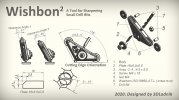DafyddElvy
1:22.5 & 15mm Scale Trams, , NG Steam Railways
My latest project requires quite a bit of small diameter drilling, around 1mm, does anyone have any experience of sharpening 1mm drill bits, please don't laugh.
Today a very small item, 4mm channel to 10mmx2.5mm brass strip, de-soldered when I went to drill a 1mm hole beside the soldered joint, 8 previous holes were drilled without trouble but the drill bit is blunt after only around 10-12 holes.
I have around 200 1mm holes to drill, and buying a new drill bit for every 10 or so holes isn't something I relish having to do.
As always any advice or suggestions appreciated, thanks.
David
Today a very small item, 4mm channel to 10mmx2.5mm brass strip, de-soldered when I went to drill a 1mm hole beside the soldered joint, 8 previous holes were drilled without trouble but the drill bit is blunt after only around 10-12 holes.
I have around 200 1mm holes to drill, and buying a new drill bit for every 10 or so holes isn't something I relish having to do.
As always any advice or suggestions appreciated, thanks.
David



